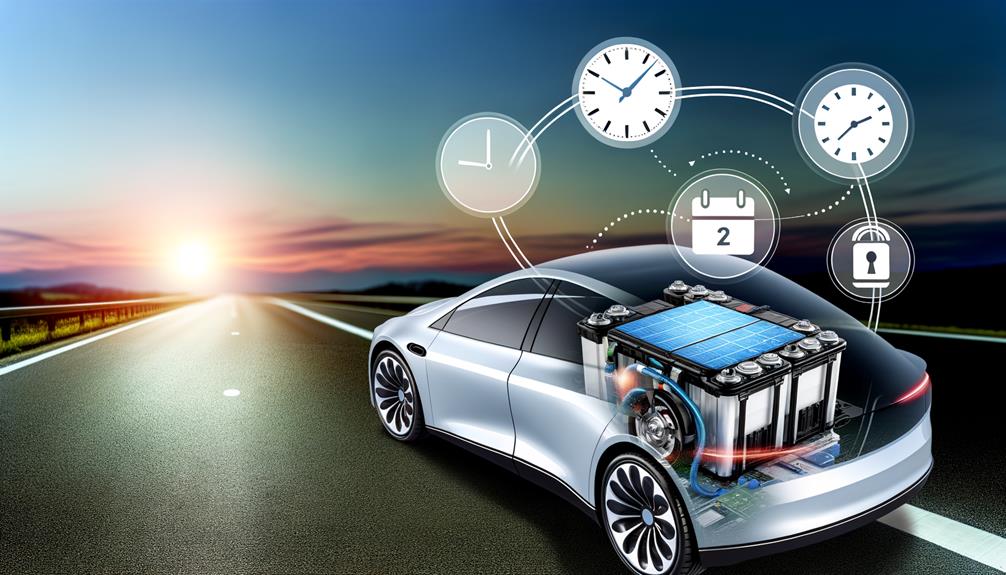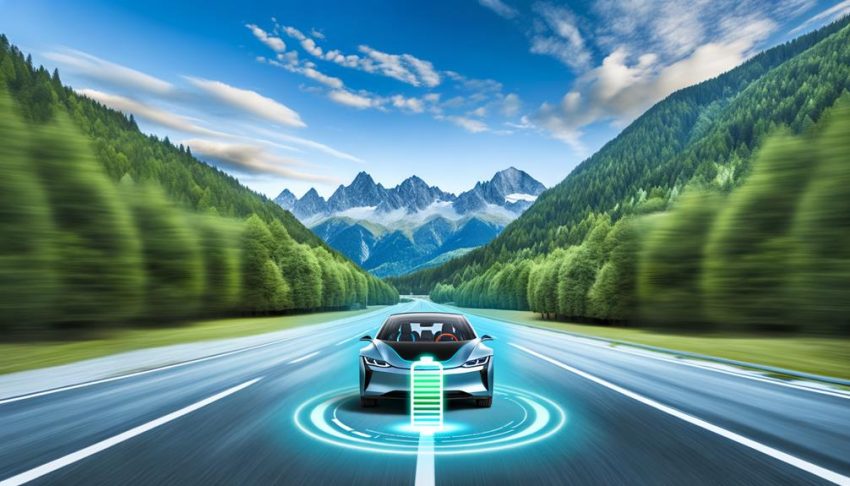When considering how long an electric car lasts, you might first think about the lifespan of its battery, which is often touted to last between 8 to 15 years or up to 300,000 miles. But it's not just about the battery; driving habits, environmental conditions, and regular maintenance also play significant roles. Manufacturers usually offer substantial warranties, yet the real longevity of electric vehicles can vary. So, what exactly influences these differences, and how might future innovations impact this? Let's explore the nuances that determine an electric car's true lifespan.
Contents
Understanding Electric Car Longevity
While electric vehicles (EVs) are increasingly popular, understanding their longevity is fundamental for potential buyers. The average lifespan of an EV typically ranges from 8 to 15 years, with many EV batteries designed to endure between 200,000 to 300,000 miles. To guarantee battery health, EV manufacturers often provide warranties covering 8 years or 100,000 miles, mitigating concerns over premature degradation.
Battery lifespan is influenced by several factors. Battery chemistry plays a key role, with advancements in lithium-ion technologies enhancing durability and performance. Additionally, climate conditions greatly impact EV batteries; extreme temperatures can accelerate wear, necessitating climate-controlled storage or usage to maximize longevity.
Your driving habits and maintenance practices are equally important. Aggressive driving and frequent rapid acceleration can strain the battery, reducing its effective lifespan. Conversely, adopting smoother driving habits can preserve battery health. Regular maintenance practices, such as software updates and system checks, are crucial for sustaining peak performance.
Charging methods also affect battery longevity. Ideal charging practices, such as limiting daily charges to 80%, can minimize stress on the battery and extend its lifespan. Fast charging, while convenient, should be reserved for occasional use, as it can elevate battery temperatures and accelerate degradation. Utilizing a dedicated home charging station with controlled charging rates can further enhance battery durability.
As battery technology evolves, future EV batteries are projected to achieve even longer lifespans and improved performance, potentially exceeding current standards. By understanding these factors and implementing best practices, you can maximize the longevity of your electric vehicle, guaranteeing a sustainable and cost-effective ownership experience.
Factors Affecting Vehicle Lifespan
Several factors can considerably influence the lifespan of electric vehicles (EVs). Understanding these elements helps you maximize your EV's longevity and performance. One of the most essential components is the battery. EV batteries typically last between 8 to 15 years, but their lifespan can be affected by various factors.
Key factors affecting your EV's lifespan include:
- Driving habits: Smooth driving can optimize battery performance. Aggressive driving, with frequent rapid acceleration and braking, can degrade the battery faster.
- Extreme temperatures: Both high and low temperatures can adversely affect battery health and overall vehicle lifespan. Moderate climates are ideal as they minimize thermal stress on the battery.
- Charging method: Using a fast charger frequently can heat up the battery more than slower charging methods, potentially shortening its lifespan. It's better to use a Level 2 charger for regular charging.
- Regular maintenance: Routine checks, especially of the battery health, can extend your EV's lifespan. Ensuring the battery management system is functioning correctly is essential.
- Moderate climates: EVs tend to last longer in moderate climates. Extreme weather conditions can strain the battery, leading to reduced performance and a shorter lifespan.
Battery Life Expectancy

Understanding the factors that influence your electric vehicle's lifespan naturally leads us to contemplate battery life expectancy. EV battery packs are a critical component determining the overall lifespan of electric vehicles. Typically, these batteries last between 8 to 15 years, equating to roughly 200,000 miles before significant battery degradation becomes a concern.
| Aspect | Details |
|---|---|
| Average Lifespan | 8 to 15 years, around 200,000 miles |
| Warranty Coverage | 8 years or 100,000 miles |
| Degradation Rate | 2% to 3% per year |
EV battery life is influenced by several factors, including charging habits, environmental conditions, and driving patterns. Manufacturers generally offer warranties covering 8 years or 100,000 miles, giving you peace of mind regarding battery performance during that period. For instance, Tesla's warranty guarantees at least 70% capacity retention, highlighting confidence in the longevity of their battery packs.
Battery degradation rates typically range from 2% to 3% per year. This degradation is affected by variables such as temperature, which can accelerate wear, and charging habits, where frequent fast charging may contribute to faster capacity loss.
| Aspect | Details |
|---|---|
| Capacity Retention | About 70% after 100,000 miles |
| Environmental Impact | Temperature and driving conditions |
| Charging Habits | Influence degradation rate |
According to the U.S. Department of Energy, EV batteries can maintain about 70% of their original capacity after 100,000 miles, underscoring their durability compared to traditional combustion engines. The energy density of modern batteries plays a pivotal role in their extended lifespan and reliability.
Maintenance and Care
Maintaining the longevity of your electric vehicle (EV) hinges on meticulous maintenance and care practices. Regular upkeep primarily involves monitoring tire pressure and brake components. Thanks to regenerative braking systems, these components typically last longer, reducing the frequency and cost of replacements.
EV batteries, while generally requiring minimal maintenance, can achieve ideal battery longevity and performance through proper charging practices. Adhering to manufacturer guidelines guarantees that the battery management system functions efficiently, mitigating the risk of premature degradation.
Keeping your EV's software updated is essential. Software updates often include enhancements to battery management algorithms, which play a pivotal role in maintaining battery health. This guarantees your vehicle operates at peak efficiency, ultimately extending its lifespan.
Extreme temperatures can greatly impact battery health. Parking your EV in a garage or shaded area shields it from harsh weather conditions, preserving battery integrity over time. Regular inspections of battery health and performance metrics, via onboard diagnostics or dedicated apps, allow you to identify and address potential issues early on.
To maintain and care for your EV effectively, consider these key practices:
- Monitor tire pressure and brake components: Verify they are in ideal condition to enhance vehicle efficiency and safety.
- Follow manufacturer charging guidelines: Proper charging practices are essential for maximizing battery longevity.
- Keep software updated: Regular updates guarantee the best battery management and vehicle performance.
- Protect from extreme temperatures: Park in shaded areas or garages to maintain battery health.
- Regularly check battery health: Use onboard diagnostics or apps to monitor performance metrics and address issues promptly.
Future Innovations and Trends

While proper maintenance and care are essential to extending the lifespan of your electric vehicle, the future holds promising innovations that could redefine vehicle longevity. Advancements in battery technology, particularly the development of solid-state batteries, promise significant increases in energy density and longevity. These batteries are projected to last longer than current lithium-ion models, potentially extending the average lifespan of EV batteries beyond the existing 8-15 years by 2030.
In addition to new battery technologies, research into battery recycling and second-life applications is set to enhance sustainability. These efforts aim to reduce waste and recover valuable materials, thereby supporting the long-term usability of EV batteries. The ability to recycle and repurpose batteries will be vital in maintaining a sustainable EV ecosystem.
Artificial intelligence (AI) and machine learning are also poised to revolutionize battery management systems. By optimizing charging cycles through predictive analytics, AI can extend battery life and improve overall efficiency. This technological integration will enable smarter, more adaptive battery management, ensuring your EV operates at peak performance for longer periods.
As the EV market continues to expand, innovations aimed at reducing the cost of battery production will make long-lasting electric vehicles more accessible to a broader range of consumers. These EV market innovations will drive wider adoption, further accelerating the shift to sustainable transportation.
Frequently Asked Questions
What Is the Life Expectancy of an Electric Car?
You'll find an electric car's life expectancy ranges from 10-20 years. With battery lifespan improvements, lower maintenance costs, and enhanced charging infrastructure, ownership experience and user satisfaction rise, while warranty coverage and resale value remain strong, reducing environmental impact.
Do Electric Cars Last Longer Than Gas Cars?
Yes, electric cars generally last longer than gas cars due to superior battery longevity, lower maintenance costs, and better performance metrics. Technology advancements and improved charging infrastructure enhance ownership experience, driving range, resale value, and environmental impact.
What Happens to EV After 8 Years?
After 8 years, expect battery degradation, reduced performance, and lowered resale value. Warranty coverage may expire, increasing maintenance costs. However, technology advancements, improved charging infrastructure, and positive owner experiences can mitigate environmental impact and align with market trends.
How Long Can an Electric Car Last on One Charge?
Your electric car's range on one charge depends on driving habits, climate impact, and battery technology. Charging infrastructure and speed reduce range anxiety, while energy efficiency and performance metrics influence maintenance costs and resale value.
Conclusion
In conclusion, your electric car can last 8 to 15 years, with batteries designed to endure 200,000 to 300,000 miles. Proper driving habits, environmental conditions, and maintenance are essential. Expect around 2% to 3% battery degradation annually, retaining about 70% capacity after 100,000 miles. With ongoing advancements in technology, the longevity and efficiency of electric vehicles will likely improve, ensuring a more sustainable future for you and your vehicle.
